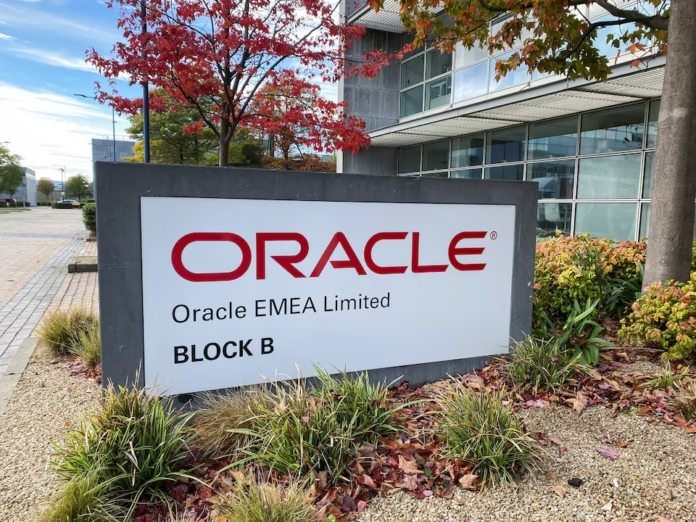TEXAS: Oracle Corp is on the verge of joining the world’s most exclusive club the $1 trillion market capitalization threshold
as its shares continue an unprecedented surge driven by soaring demand for artificial intelligence (AI) cloud computing. The company’s meteoric rise has not only electrified the technology sector but also intensified competition among global tech giants racing to dominate the AI economy.
The 47-year-old enterprise software maker, once regarded as a traditional database company, has transformed into a key player in the AI infrastructure boom.
At the center of this surge are multi-billion-dollar contracts for cloud services that provide computing power to some of the largest AI developers in the world.
On Wednesday, Oracle’s shares spiked nearly 36% in a single session its biggest one-day rally in decades before climbing another 2% in premarket trading on Thursday.
This momentum lifted its market value to $933 billion, putting it within striking distance of the trillion-dollar milestone already occupied by Apple, Microsoft, Alphabet, Amazon, and Nvidia.
Fueling much of the optimism is a blockbuster report from The Wall Street Journal that OpenAI, creator of ChatGPT, has signed a $300 billion computing power agreement with Oracle.
The deal, one of the largest technology contracts in history, is expected to account for the bulk of the new revenue Oracle revealed earlier this week.
Analysts say this partnership positions Oracle at the heart of the generative AI revolution, where computing power is now as critical as algorithms and data.
Oracle lit a fire under the rekindled AI trade, said Richard Hunter, head of markets at Interactive Investor. Its billion-dollar demand outlook has triggered a ripple effect, lifting not just its own stock but also the entire AI supply chain.
The surge has had dramatic implications for Oracle’s billionaire co-founder Larry Ellison. His net worth jumped by almost $100 billion in days, reaching $392.6 billion, largely due to his 41% stake in Oracle.
Ellison now stands within reach of overtaking Tesla CEO Elon Musk, who remains the world’s richest man with $439.9 billion.
The growing rivalry underscores how the AI revolution is reshaping not only corporate balance sheets but also the global wealth rankings dominated by tech moguls.
The rally has lifted other AI-related companies. Chipmakers Nvidia and Broadcom, which supply semiconductors crucial for powering cloud data centers, saw their shares edge higher.
Asian technology peers also posted gains, reflecting how Oracle’s success has boosted sentiment across global markets.
At the same time, Oracle’s premium valuation is drawing attention. The company’s 12-month forward price-to-earnings (P/E) multiple has climbed to 45.3, well above rivals Amazon (31.3) and Microsoft (31).
While bulls argue that the AI boom justifies the higher multiple, skeptics caution that expectations may be running ahead of fundamentals.
Oracle’s ascent is particularly striking given its reputation as a legacy software firm. For years, analysts doubted its ability to compete with Amazon Web Services (AWS), Microsoft Azure, and Google Cloud. However, the AI revolution has changed the dynamics.
Oracle’s investments in high-performance infrastructure, combined with deep-pocketed clients eager to secure computing power, have catapulted the company into the center of the cloud wars.
“The trillion-dollar club is no longer about consumer devices or online advertising, said tech analyst Marissa Klein.
It’s about who can supply the infrastructure that will power AI and Oracle has become one of the most critical players almost overnight.
For investors, Oracle’s surge represents both an opportunity and a warning. On one hand, the company is tapping into a structural trend that could fuel earnings growth for years.
On the other, the speed of its rise raises concerns about overvaluation and the sustainability of AI-driven hype cycles.
Still, for now, the market momentum appears firmly in Oracle’s favor. With a historic OpenAI deal in hand, surging demand for AI infrastructure, and investors cheering its breakout performance, the company looks poised to cement its place alongside the trillion-dollar titans of the tech world.



